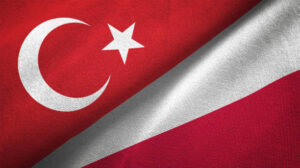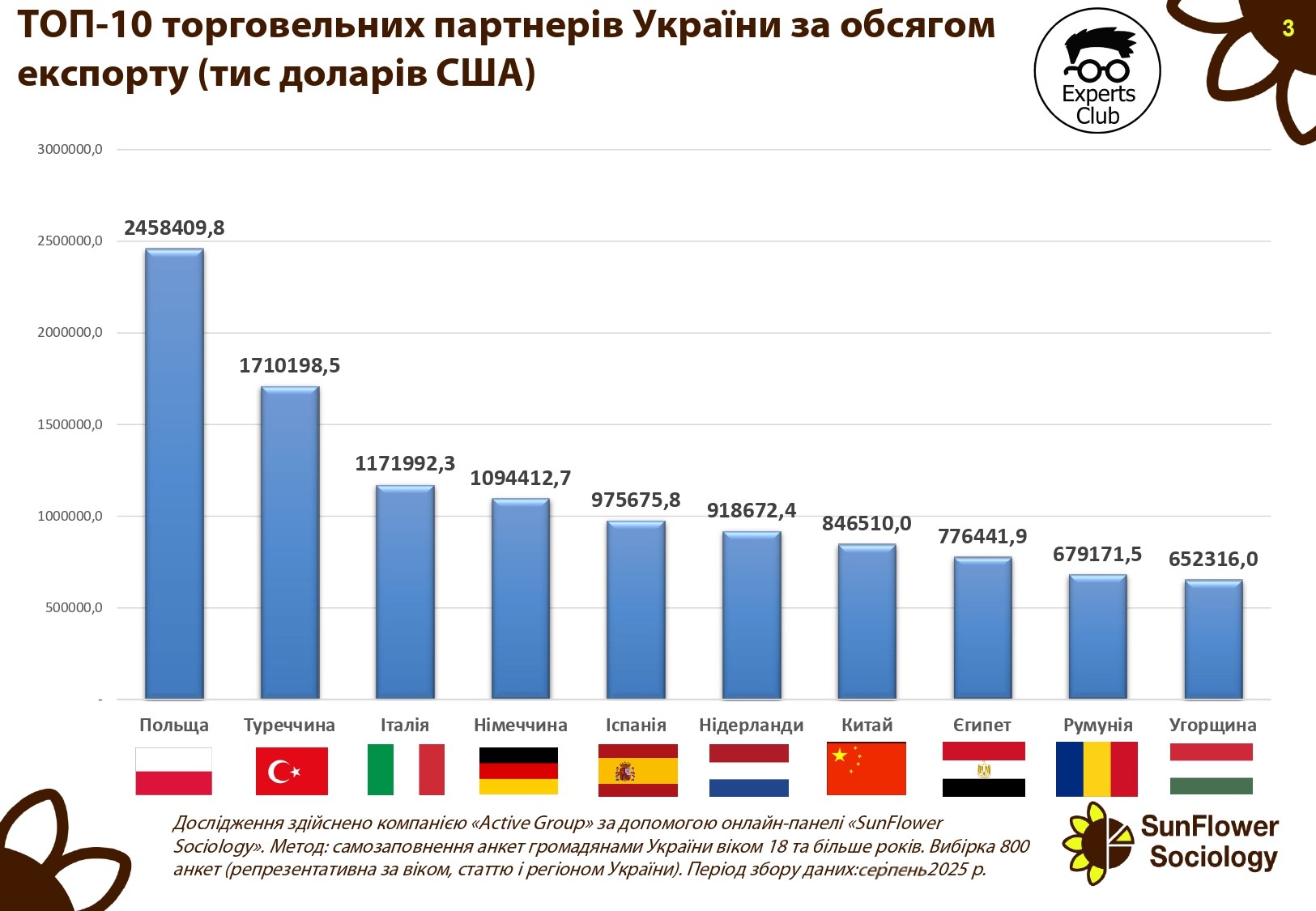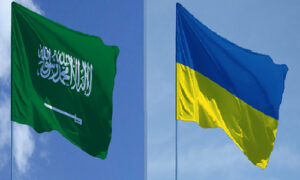
According to the results of the first half of 2025, Poland remains Ukraine’s main trading partner in terms of export volumes. According to research by Active Group and Experts Club, exports to Poland amounted to US$2.45 billion.
Turkey ranks second with USD 1.71 billion, and Italy ranks third with USD 1.17 billion. Other major partners include: Germany ($1.09 billion), Spain ($976 million), the Netherlands ($919 million), China ($847 million), Egypt ($776 million), Romania ($679 million), and Hungary ($652 million).

“The structure of Ukraine’s exports shows a clear focus on European Union countries. Poland, Italy, Germany, Spain, and the Netherlands together account for more than half of total exports. This indicates Ukraine’s strategic integration into the European economic space,” emphasized Maksim Urakin, founder of Experts Club and economist.
He also noted that Turkey remains a critically important partner for Ukrainian agricultural and metallurgical exports, while China and Egypt are key markets for agricultural products, particularly grains.
“The presence of trading partners such as Egypt and China diversifies Ukrainian exports,” Urakin added.
CHINA, ECONOMY, EGYPT, EXPERTS CLUB, EXPORTS, GERMANY, HUNGARY, ITALY, POLAND, ROMANIA, TRADE, TURKEY, UKRAINE, МАКСИМ УРАКИН

In January-August 2025, Ukraine exported nearly 1.4 billion eggs worth $119.5 million, which is 2.6 times more than in the same period of 2024, according to the Ukrainian Poultry Union.
The industry association noted that in August, Ukrainian producers exported 168.2 million eggs worth a total of $16.4 million, which is 81.9% more than in the same period of 2024.
The main buyers of Ukrainian eggs in January-August 2025 were Spain (11% of total exports), Croatia (10.9%), and the United Kingdom (10.6%).
The largest shipments in August were to Spain (37.1 million eggs), the Czech Republic (28.9 million eggs), and Poland (21.7 million eggs).

Kazakhstan has introduced its own cryptocurrency, the Evo stablecoin (KZTE), issued with the support of the international payment system Mastercard. The new digital asset is pegged to the national currency at a ratio of 1 to 1 with the tenge, which ensures its stability and transparency.
According to the developers, Evo will become a universal tool for cashless payments and online transactions both within the country and abroad. In the future, the coin may take the place of a full-fledged means of payment, integrated into the financial system of Kazakhstan and supported by leading banks and fintech companies.
Experts note that the launch of KZTE reflects Kazakhstan’s desire to strengthen its position in the field of digital finance and accelerate the introduction of blockchain technologies into the economy.
Source: https://www.fixygen.ua/news/20250924/kazahstan-zapustiv-natsionalniy-steyblkoin.html

According to Serbian Economist, the Serbian Economists’ Association (SEA) will host the 11th World Congress of Economists, which will take place in Belgrade from June 22 to 26, 2026, the SEA announced.
More than 1,000 leading global economists from prestigious universities are expected to attend. A delegation from the International Economic Association (IEA) was in Belgrade during this time, with SES representatives, led by Chairman Aleksandar Vlahovic, agreeing on the organizational and program details of the forum.
“We had very productive meetings, discussed key issues, and proved that we are ready to organize such a prestigious event at the highest level,” Vlahovic said.
According to him, the importance of the congress is underscored by the fact that the program committee is headed by Harvard University professor and Nobel Prize winner in economics Eric Maskin. Other Nobel laureates and experts who have held key positions in the economic policy of the world’s leading countries are also expected to arrive in Belgrade.
The congress is being held in Southeast Europe for the first time and is returning to Europe after 20 years. The SES believes that this forum will be an opportunity for universities and research institutes in Serbia and the region to establish strong ties with the global academic community, and for businesses and authorities to receive direct recommendations from leading economists.
The World Congress is organized by the International Economic Association (IEA) every three years. The forum brings together hundreds of scientists and experts to discuss global economic trends and new scientific approaches. In 2023, the congress was held in Medellin, Colombia, and brought together representatives of the academic and business worlds from all continents.
The main role of the congress is to bring together academic science and practice, develop dialogue between economists and politicians, and shape innovative solutions for the global economy.
https://t.me/relocationrs/1463

The Argentine government has temporarily abolished high export duties on grain, soybeans, and soybean products, which previously ranged from 25% to 31%, until October 31, 2025, according to GrainTrade. The move is aimed at increasing foreign exchange earnings and stabilizing the national currency amid the economic crisis.
The political context of the decision is linked to the defeat of President Javier Milei’s party in local elections in the province of Buenos Aires. This has heightened investor doubts about the government’s stability and caused the peso to devalue. The central bank has spent more than $1.1 billion of its reserves over the past three days to support the currency market. In total, Argentina has already used $20 billion in funding from the IMF this year.
The abolition of tariffs will sharply increase the supply of soybeans, soybean meal, and oil on the global market. On September 22, November soybean futures in Chicago fell by 1.5% to $371.1/t, and over the week, the decline was 3.3%.
Experts predict further pressure on prices, especially if trade negotiations between the US and China stall.
China, which diversified its imports after the trade war with the US, increased its purchases of Argentine soybeans to a six-year high of 8.81 million tons last year. This reduced domestic processing: in July, about 31% of enterprises were idle, and now the figure is even higher, according to the CIARA-CEC exporters’ association.
For Ukraine, Argentina’s decision means:
increased competition in key markets in Europe and Southeast Asia;
lower export prices for soybeans and soybean products;
pressure on domestic prices from processors due to cheaper soybean meal and oil from Latin America.

Representatives of Saudi Arabia have expressed their willingness to cooperate in the restoration of critical infrastructure in the Kyiv region, in particular in the completion of the construction of a secondary school for 600 students in the village of Hora, Boryspil district, according to the head of the Kyiv Regional Military Administration (OVA), Mykola Kalashnik.
“I held an online meeting with representatives of the Humanitarian Fund of His Royal Highness Prince Al-Walid bin Talal bin Abdulaziz Al Saud and the Ukrainian-Arab Business Council. I sincerely thanked our partners from the Kingdom of Saudi Arabia for their willingness to cooperate and their genuine interest in restoring critical infrastructure in the Kyiv region,” he wrote on Telegram on Tuesday.
According to him, the Saudi side confirmed its support for the Kyiv region and its openness to implementing joint humanitarian and social projects. “The key topic of the conversation was the discussion of the completion of the construction of a secondary school for 600 students in the village of Hora in the Boryspil district – an important facility for the community, the construction of which was halted due to the full-scale war,” Kalashnik specified. He reported that the main part of the school has already been built. However, in order to fully commission it, a number of engineering, finishing, and improvement works remain to be completed, as well as the construction of a modern shelter in accordance with safety requirements. According to the head of the OVA, the possibility of involving the Prince Al-Waleed Fund in this project was discussed with the Saudis.
“We are counting on partnership participation in financing the final phase of construction, because this school is the future for hundreds of children in the community,” Kalashnik added.
“I also invited representatives of Saudi businesses to cooperate with the Kyiv region. Our region is not only an area in need of restoration, but also a region of great opportunities. There is potential for launching investment projects in the fields of construction, agriculture, energy, and manufacturing. The interest shown by our Arab partners is further proof that the Kyiv region remains promising and economically attractive even in difficult times,” said the head of the region.